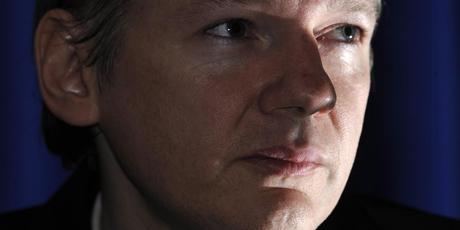|
LONDON
-
WikiLeaks founder Julian Assange issued a plea from jail for his
supporters to keep fighting as the British Government braced for a
likely attack on government websites.
Extra security
measures were added to a host of British government web services, in
particular those used to claim benefits or provide tax information,
after Sir Peter Ricketts, the national security adviser, warned
permanent secretaries across all departments in Whitehall that "hacktivists"
who last week targeted the sites of companies such as MasterCard and
PayPal could switch their focus to Britain.
Downing St officials
confirmed they believed today's court appearance by Assange - in custody
after his arrest on sex allegations at the request of the Swedish
authorities - could be used by hackers as an excuse to switch their
focus to key cyber infrastructure such as the website of HM Revenue and
Customs.
Members of the online
collective Anonymous have already signalled their willingness to attack
British targets if Assange - who denies the claims and whose lawyers
will today apply for bail - is extradited to Sweden. Almost 600,000
people have signed an online petition in support of WikiLeaks.
The Sunshine Coast
Daily reported that Assange had said he was determined to fight for the
future of WikiLeaks.
"My convictions are
unfaltering. I remain true to the ideals I have always expressed," he
said in a statement from Wandsworth Prison in London, conveyed by his
mother Christine.
"These circumstances
shall not shake them. If anything, this process has increased my
determination that they are true and correct. We now know that Visa,
Mastercard and Paypal are instruments of US foreign policy. It's not
something we knew before. I am calling on the world to protect my work
and my people from these illegal and immoral acts."
Christine Assange was
not able to see her son face-to-face yesterday but a 10-minute phone
call reunited the duo. It was the first time the Noosa woman had spoken
to her son since he was arrested.
Assange told his
mother there were CCTV cameras monitoring his cell because of fears he
could be assassinated for his role in releasing 250,000 confidential US
government documents.
The ability of
amorphous groups such as Anonymous to disrupt and paralyse websites was
displayed again yesterday when hackers obtained the passwords of 1.3
million users of the gossip website Gawker and posted them online. The
motivation for the attack, claimed by a group calling itself Gnosis, was
not clear, but Gawker has previously published blogs criticising Assange
and 4chan, the messaging board that spawned Anonymous. In the wake of
the attack, Gawker's Twitter accounts were hijacked to publish messages
supporting WikiLeaks.
Amazon, the world's
biggest online retailer, insisted yesterday that the disappearance of
its European websites for about 30 minutes on Monday was due to a
"hardware failure". The company is one of those which had been
threatened as part of Operation Payback, the attempt by Anonymous to
mount attacks against companies which withdrew services from WikiLeaks.
The anger of
Assange's supporters is likely to be increased by a claim from his
British lawyer yesterday that a grand jury has been secretly empanelled
in Virginia to consider charges against the Australian over the leaked
diplomatic telegrams.
IT experts have
warned that Whitehall is particularly vulnerable to cyber attacks
because many computers still run on an outdated version of Internet
Explorer known to be at particular risk to hackers. The Government has
ruled out an upgrade on the grounds of cost.
In newly released cables published by WikiLeaks, it was revealed that
British police helped to "develop" evidence against
Madeleine
McCann's parents as they were investigated by Portuguese
authorities looking into their daughter's disappearance.
Britain's
ambassador to Portugal, Alexander Wykeham Ellis, reportedly made the
claim to his American counterpart on September 21, 2007 - two weeks
after Portuguese police named Gerry and Kate McCann as "arguidos", or
formal suspects.
In a cable to Washington, US Ambassador Al Hoffman wrote: "Without
delving into the details of the case, Ellis admitted that the British
police had developed the current evidence against the McCann parents,
and he stressed that authorities from both countries were working
co-operatively."
The cable does not specify what evidence British police are alleged to
have gathered, or whether UK investigators were involved in the decision
to formally name the McCanns as suspects. They remained under official
suspicion until July 2008 when Portuguese police shelved the
investigation into Madeleine's disappearance.
- Independent, AFP,
PA |


